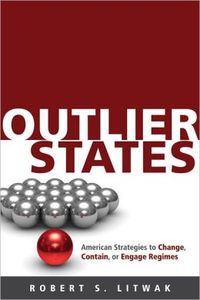

Purchase
American Strategies to Change, Contain, or Engage Regimes
Woodrow Wilson Center Press
June 2012
On Sale: June 4, 2012
238 pages
ISBN: 1421408120
EAN: 9781421408125
Paperback
Add to Wish List
Non-Fiction Political
In the Bush era Iran and North Korea were branded "rogue"
states for their flouting of international norms, and
changing their regimes was the administration’s goal. The
Obama administration has chosen instead to call the
countries nuclear "outliers" and has proposed means other
than regime change to bring them back into "the community of
nations." Outlier States, the successor to Litwak’s
influential Regime Change: U.S. Strategy through the Prism
of 9/11 (2007), explores this significant policy adjustment
and raises questions about its feasibility and its possible
consequences. Do international norms apply only to states’ external
behavior, as it might relate, for example, to nuclear
proliferation and terrorism, or do they matter no less for
states’ internal behavior, as it might affect a population’s
human rights? What is the appropriate role for the United
States in the process of reintegration? America’s military
power remains unmatched, but can the nation any longer shape
singlehandedly an increasingly multi-polar international
system? What do the precedents set in Iraq and Libya teach
us about how current outliers can be integrated into the
international community? And perhaps most important, how
should the United States respond if outlier regimes eschew
integration as a threat to their survival and continue to
augment their nuclear capabilities?
Comments
No comments posted.
Registered users may leave comments.
Log in or register now!
| 


 © 2003-2025 off-the-edge.net
all rights reserved Privacy Policy
© 2003-2025 off-the-edge.net
all rights reserved Privacy Policy